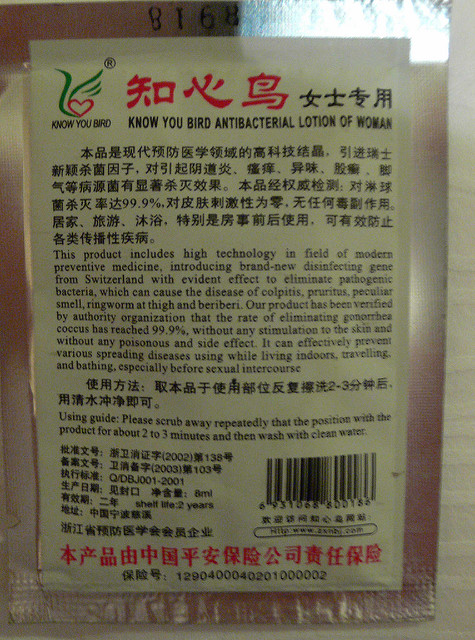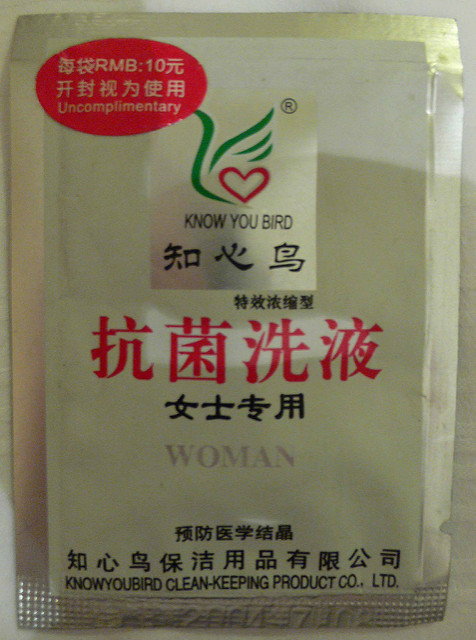Know your bird
« previous post | next post »
We have been discussing the "TCM approach to women's wellness" (7/28/16). Jichang Lulu writes: "On the topic of women's wellness, I'm reminded of Messrs Know your Bird, purveyors of Antibacterial Lotion of Woman." Here's a picture:

(via Flickr)
I will let readers feast their eyes upon the marvelous English text without critiquing the translation at every turn. In point of fact, the translation is not so bad; it's the Chinese original that leaves one's mouth gaping. Instead, I will only discuss the name of this wonderful lotion, which is encapsulated in the logo, and a few other interesting features of the language on the packet.
The Chinese says:
zhīxīn niǎo nǚshì zhuānyòng 知心鸟女士专用
How that becomes "KNOW YOU BIRD ANTIBACTERIAL LOTION OF WOMAN" is not entirely clear, because the Chinese says nothing about "antibacterial lotion" and nothing about "you". What it does say is this:
"intimate (lit., 'know the heart') bird, especially for ladies"
I suppose that, by "heart", they mean "your heart", so that, in a circuitous fashion, would account for the "you".
The other phrase I wanted to talk about is "brand-new disinfecting gene from Switzerland". I was more than a little discombobulated by this miraculous gene from Switzerland, till I looked at the Chinese, that is. What the Chinese says is Ruìshì xīnyǐng shājùn yīnzǐ 瑞士新颖杀菌因子", which means "brand-new bactericidal factor from Switzerland". It seems that the translator confused yīnzǐ 因子 ("factor") with jīyīn 基因 ("gene").
If we turn the packet over, this is what we see:

(via Flickr)
Here it says very clearly that this is kàngjùn xǐ yè 抗菌洗液 ("antibacterial lotion") that is nüshi zhuanyong 女士专用 ("especially for women"), which they translate as "WOMAN".
At the bottom, it identifies the manufacturer of this fantastic product as:
zhīxīn niǎo bǎojié yòngpǐn yǒuxiàn gōngsī 知心鸟保洁用品有限公司
KNOWYOUBIRD CLEAN-KEEPING PRODUCT CO. LTD.
At the top left it tells the price and says:
kāifēng shì wéi shǐyòng 开封视为使用
("if the seal is broken will be considered as used", i.e., you'll have to pay for it)
…which they cleverly render as "Uncomplimentary".
Russell, who posted these pictures on flickr, writes:
I'm not sure what normally goes on in 5 star hotels in China – there was also a sachet "for man" but those photos didn't come out
I would pay a considerable sum of money to see the "MAN" sachet, front and back.
Fluxor said,
July 29, 2016 @ 10:11 pm
Here's a link to the man sachet: http://www.hotelex.cn/chanpin/1016525.html
Ethan said,
July 29, 2016 @ 10:51 pm
Beri-beri is a vitamin deficiency. Treatment consists of eating thiamine-rich foods or in emergency cases receiving intravenous thiamine. Are they expecting hotel guests to ingest or inject this stuff?
Bathrobe said,
July 29, 2016 @ 11:38 pm
知心 zhīxīn in Chinese has the meaning of 'close, intimate, familiar, or bosom' as applied to friends. The implication is that the friend is so close to you that they "know your heart". Is there any possibility that this little bird is something that you would turn to for very confidential or intimate matters?
There is an author called 知心鸟 at Wotiao, which is some kind of life advice site. The author describes himself thus: 知心鸟专门为大家提供各种教师、家长、学生资源的小小鸟,希望我将成为您成长道路上的一位知心小伙伴。The meaning is something like "Intimate Bird is a little bird who specifically provides all kinds of resources for teachers, parents, and students. I hope I can be a small intimate partner on your road of growth." I've translated 知心 as 'intimate', but the meaning is that the author is someone who can be turned to like a true and intimate friend.
Hilary Smith said,
July 30, 2016 @ 12:04 pm
@Ethan,
What they're translating "beriberi," jǐao qì 脚气, here should be translated "athlete's foot" or "tinea pedis" instead. This Chinese term has meant all sorts of things historically but came to be associated with beriberi in the late nineteenth century in Japan, and in the twentieth century the beriberi translation was carried back to China, where it still appears as the first dictionary definition of jǐao qì 脚气. So that's probably how the translator came up with that, even though the far more common colloquial understanding of jǐao qì, and clearly the one intended here, is athlete's foot.
I wrote a dissertation on this sort of thing — how the meanings of Chinese disease names have changed over time. Sure to be a New York Times best seller sometime soon. :)
Victor Mair said,
July 30, 2016 @ 1:03 pm
I'm pleased that Hilary Smith weighed in on jiǎoqì 脚气, because she is THE expert on this complex of diseases (I know that because I read her dissertation). As a former basketball player, I'm quite familiar with jiǎoqì 脚气 when it means "athlete's foot", fortunately not when it means "beriberi".
I like very much Hilary's description of jiǎoqì 脚气 as a round-trip word, a concept that we've discussed many times on Language Log, most recently here:
"Japan: crazy over portmanteaux" (7/26/16) and in this comment to that post.
j2h said,
July 30, 2016 @ 1:08 pm
Some more "Know You Bird" products: Senior Man Trousers and Senior Woman Trousers (actually boxed pairs of underpants)
(The Chinese is 高級男士内裤 / 高級女士内裤. "高級" means "senior" only in the "senior in rank" sense – as in "senior manager" – rather than "senior in age" as an English speaker would probably assume in this context)
Bathrobe said,
July 30, 2016 @ 3:48 pm
高级 gāojí would normally be understood as 'high class' or 'high quality'.
John said,
July 31, 2016 @ 10:54 am
Hilary Smith: Is athlete's foot no longer known as 香港腳 on the mainland? Or has it always been Taiwan-only?
KeithB said,
August 1, 2016 @ 8:43 am
What's next? diagramming Dr. Bronner's soap label?
http://www.straightdope.com/columns/read/904/why-the-weird-religious-ravings-on-dr-bronners-soap
Hilary Smith said,
August 11, 2016 @ 4:46 pm
John:
Sorry for the delayed response — yes, 香港脚 is also used on the mainland, but 脚气 is more common, I think (though it may depend on which part of the country you're in). Most people I've talked to seem to think of 香港脚 as colloquial and 脚气 as more formal.